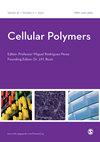模具动态温度控制对微孔注射成型件熔体压力、孔结构和力学性能的影响:实验研究
IF 1.9
4区 医学
Q4 MATERIALS SCIENCE, BIOMATERIALS
引用次数: 0
摘要
本文通过实验研究了动态模具温度控制(DMTC)对微孔注射成型(MIM)零件熔体压力、蜂窝结构和力学性能的影响。研究发现,随着模具温度的升高,冷却阶段发泡压力的持续时间增加。同时,MIM成型件中的平均晶胞直径和晶胞直径分散度增加,晶胞密度降低。模具温度的转折点在所用塑料材料的玻璃化转变温度附近,在此之后,冷却阶段的发泡压力和MIM成型部件中的蜂窝状结构产生显著变化。在DMTC条件下,随着模具温度的升高,无焊缝的单浇口MIM成型试样的拉伸强度、弯曲强度和冲击强度变化不大,而有焊缝的双浇口MIM成形试样的抗拉强度和弯曲强度明显增加。当模具温度提高到120°C及以上时,有焊缝的双浇口MIM成型试样的拉伸强度、弯曲强度达到了与无焊缝的单浇口试样相当的水平。本文章由计算机程序翻译,如有差异,请以英文原文为准。
Effects of dynamic mold temperature control on melt pressure, cellular structure, and mechanical properties of microcellular injection-molded parts: An experimental study
In this work, the effects of dynamic mold temperature control (DMTC) on melt pressure, cellular structure, and mechanical properties of microcellular injection molding (MIM)-molded parts are investigated experimentally. It is found that with the increase of the mold temperature, the duration of foaming pressure in the cooling stage increases. Meanwhile, the average cell diameter and cell diameter dispersion increases as well as the cell density decreases in MIM molded parts. The turning point of mold temperature after which the foaming pressure in the cooling stage and the cellular structure in MIM molded parts generate a significant change is around the glass transition temperature of the used plastic material. Under DMTC conditions, with the increase of mold temperature, the tensile strength, flexural strength, and impact strength of MIM molded specimens of single gate without weld line change a little, while the tensile strength, flexural strength of MIM molded specimens of double gates with weld line increase obviously. When the mold temperature increases to 120°C and over, the tensile strength, flexural strength of MIM molded specimens of double gates with weld line reach an equivalent level of specimens of single gate without weld line.
求助全文
通过发布文献求助,成功后即可免费获取论文全文。
去求助
来源期刊

Cellular Polymers
工程技术-材料科学:生物材料
CiteScore
3.10
自引率
0.00%
发文量
9
审稿时长
3 months
期刊介绍:
Cellular Polymers is concerned primarily with the science of foamed materials, the technology and state of the art for processing and fabricating, the engineering techniques and principles of the machines used to produce them economically, and their applications in varied and wide ranging uses where they are making an increasingly valuable contribution.
Potential problems for the industry are also covered, including fire performance of materials, CFC-replacement technology, recycling and environmental legislation. Reviews of technical and commercial advances in the manufacturing and application technologies are also included.
Cellular Polymers covers these and other related topics and also pays particular attention to the ways in which the science and technology of cellular polymers is being developed throughout the world.
 求助内容:
求助内容: 应助结果提醒方式:
应助结果提醒方式:


